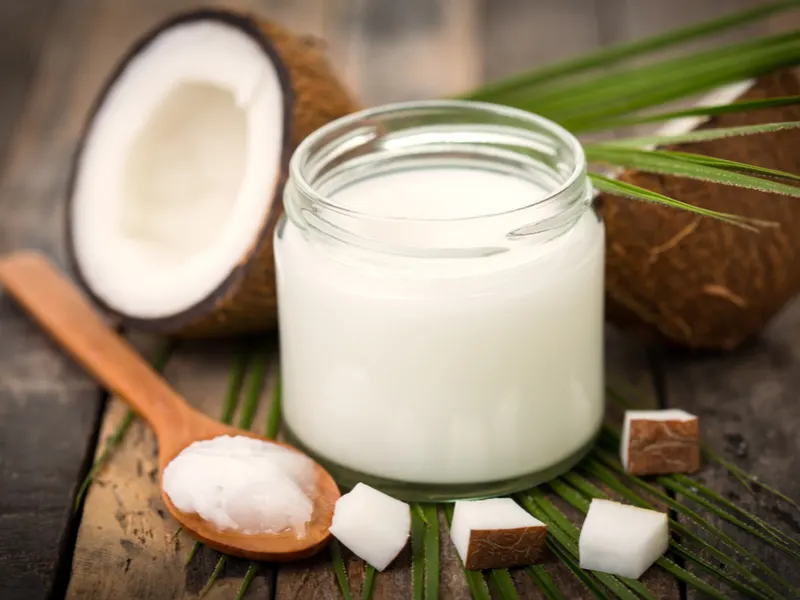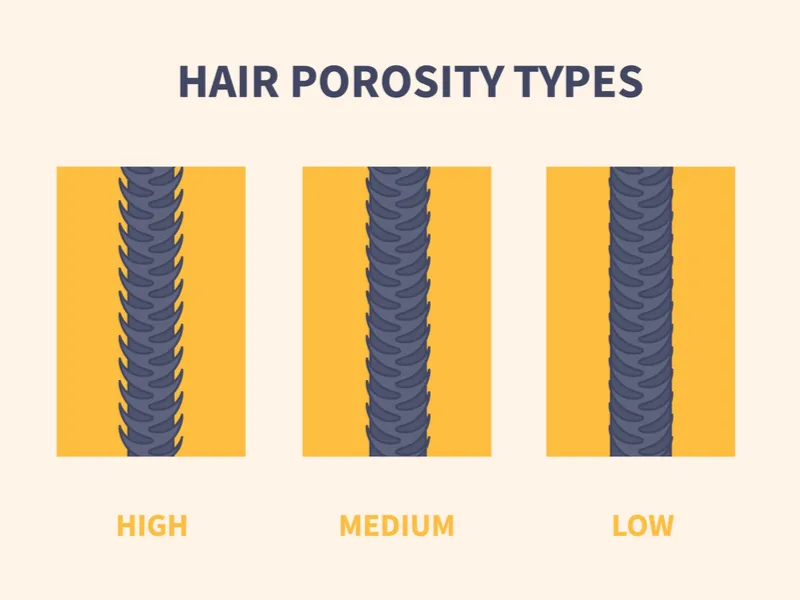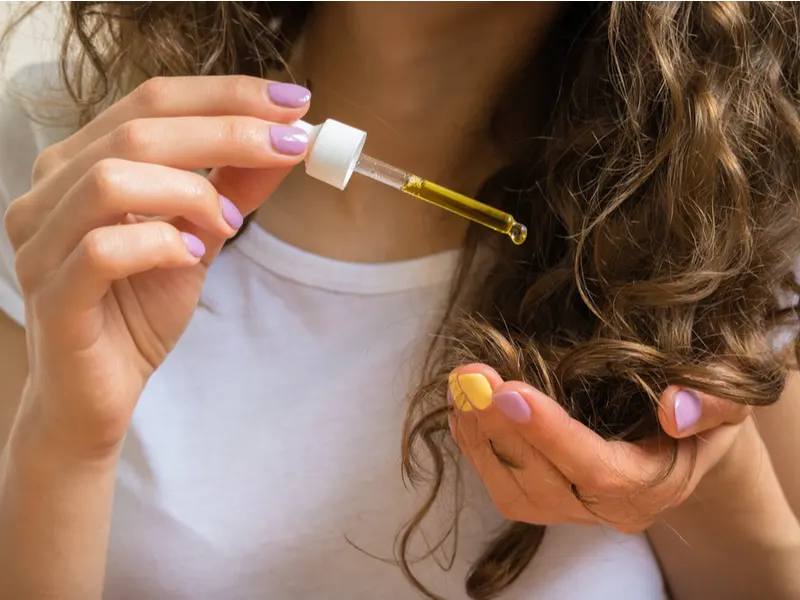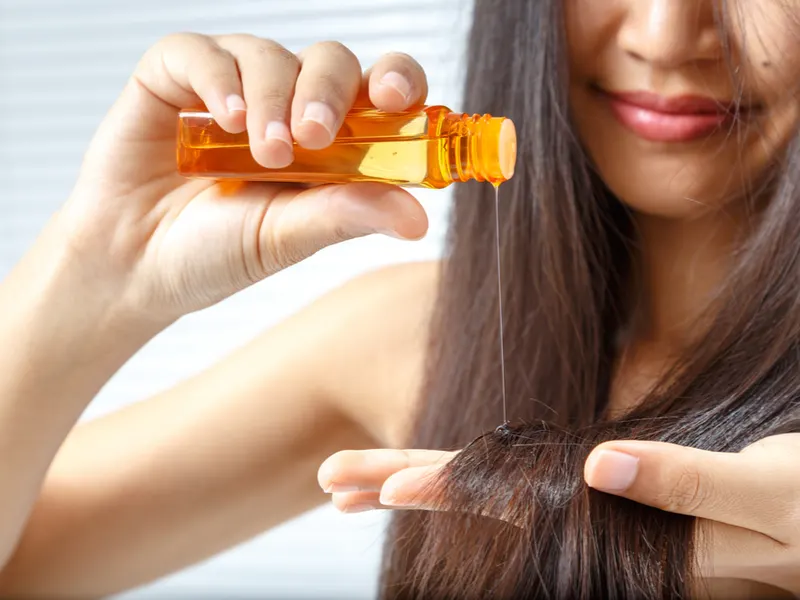Jump to:
With so much buzz around coconut oil, it might get you wondering—is coconut oil good for low porosity hair? Unfortunately, coconut oil isn’t usually a good choice for people with low porosity hair, and we’ll explain why.
Is Coconut Oil Good for Low Porosity Hair?

Yuriy Ivanovskiy/Shutterstock
Coconut oil is great for all types of hair, including low porosity hair. However, because the molecular makeup of your hair cuticles doesn’t allow them to fully open, it’s difficult for coconut oil’s large molecules to pass through.
We’ll break this down in more detail in addition to covering the following:
- Impact of coconut oil on low porosity hair
- The best type of coconut oil
- Coconut oil alternatives
- How to apply oil to low porosity hair
Applying coconut oil and other oils to your hair can be a risky endeavor if you don’t know what you’re doing. So, we’ll teach you the best strategies along with the many benefits your hair can receive by doing so.
Read Next: Coconut Oil for Hair: Miracle or Scam?
Understanding How Coconut Oil Affects Low Porosity Hair

Art4stock/Shutterstock
If you’re reading this article after already applying coconut oil to your low porosity hair, you might have a greasy mess on your head. Let’s explore the scientific reasoning behind why this happens.
What Is Low Porosity Hair?
Low porosity hair is a trait where cuticles on the hair are so close together that they don’t allow the cuticles to absorb products like coconut oil properly. Conversely, people with average to large-spaced cuticles can use coconut oil on their hair with few issues, given that their cuticles have space to expand.
Signs that you have low porosity hair include:
- Water droplets form on top of your hair when you first step into the shower
- It takes a long time for water to absorb into your hair
- Resistant to dyes, perms, and bleaching
- Drying your hair takes a long time
It might sound discouraging, but there’s nothing you can do to change your cuticle makeup. It’s a genetic trait that’ll be with you for life. The good news is that there are several effective conditioning choices for low porosity hair.
And we’ll explore them soon. Furthermore, low porosity hair gives your hair shinier, less frizzy qualities that people with high porosity hair would envy.
Properties that Make Coconut Oil Challenging for Low Porosity Hair
If you enjoy staying up-to-date on scientific studies, you might already know that researchers found that coconut oil is the most effective oil for reducing protein loss for both damaged and undamaged hair. They compared coconut oil against sunflower and mineral oil.
They believe this is because coconut oil is a triglyceride of lauric acid, so it gravitates to hair proteins. That, coupled with its low molecular weight and straight linear chain, means that it can enter inside many hair shafts.
Unfortunately, the situation isn’t so simple for people with low porosity hair. That’s because most types of coconut oil have large molecules. For this reason, the oil can’t pass through to the hair cuticles.
Side Effects of Coconut Oil on Low Porosity Hair
Given that coconut oil can’t pass through to many low porosity hair types, if you apply it, your hair and scalp will likely experience a series of unpleasant side effects. Some of the most common ones include:
- Greasy hair
- Itchy scalp
- Dry hair
- Reduced hair growth
The bottom line is that since coconut oil usually can’t penetrate low porosity hair’s cuticles, it ends up building up an icky layer on your hair and scalp. The result is an uncomfortable scalp and hair that’s greasy and dry.
Although it sounds counterintuitive, the dryness occurs from the coconut oil blocking any products you usually use that effectively keeps your hair from drying out.
Read Next: What Is My Hair Porosity? Quiz
The Exception to the Rule

Progressman/Shutterstock
Like so many things in life, the spacing of cuticles ranges on a scale, depending on the person. So, if your hair falls somewhere between low porosity and average porosity, you might be able to use coconut oil. Your hairdresser will be able to help you determine your hair’s porosity level.
Why the Type of Coconut Oil Matters
Virgin coconut oil is the worst oil you can use on low porosity hair since it’s so heavy. So, if you choose to go the coconut oil route, we recommend applying fractionated coconut oil to your hair.
The reason being is that fractionated coconut oil has relatively smaller molecules, making it absorb more easily into hair that’s in the low porosity category. You can even add some drops of essential oil to it to spruce up the aroma.
Tips for Using Coconut Oil
According to scientists, coconut oil has the ability to improve scalp health, promote hair growth, and potentially serve as an antifungal because of its lauric acid. So, if you’re still on the coconut oil train, and want to experience its benefits, below are some tips we recommend.
- Don’t over-apply coconut oil. Less is more—you can always add oil if needed.
- Mix coconut oil with other products or ingredients to reduce its strength
- Keep it away from your scalp if you have sensitive skin
Benefits of Coconut Oil
Should you give fractionated coconut oil a try on your low porosity hair with positive results, that’s great! Below are some of the benefits you can expect to experience by applying this oil regularly.
- Shinier hair
- Improved hair growth
- More moisturized hair
- Less damage from heat products like straighteners
The 100% fat content in coconut oil may also help it soothe an itchy scalp. However, we recommend testing coconut oil on a patch of your skin before applying it to your scalp to ensure it won’t have an adverse reaction.
Better Oils for Low Porosity Hair

Madelieine Steinbach/Shutterstock
So, is coconut oil good for low porosity hair? Now that you know that the answer is “probably not,” let’s explore what some better natural products you can use for moisturizing your hair are.
Of course, you can’t expect these oils to advertise their molecule sizes on the bottle. So instead, some signs that they could be a good fit for your low porosity hair include:
- Liquid at room temperature
- Lighter weight oil
In other words, coconut, olive, and castor oils are all oils you should avoid applying to your hair.
Jojoba Oil
Jojoba oil is an excellent option for low porosity hair because it’s a lightweight oil that is high in the following nutrients:
- Vitamins C, B, and E
- Zinc
- Copper
If you’re looking for an oil to seal the tips of your hair to prevent dead ends while simultaneously moisturizing your scalp, jojoba oil is a great fit.
Grapeseed Oil
Grapeseed oil does a beautiful job at soaking into low porosity hair because it’s so lightweight with such small molecules. Some people even say that it can support hair growth.
Furthermore, applying grapeseed oil to your hair will result in stronger, more supple locks. You’ll also get an extra boost of healthy shine.
Apricot Kernel Oil
Yes, there really is such a thing as apricot kernel oil, and the nearly residue-free liquid is ideal for using on low porosity hair. Some of the nutrients that make apricot kernel oil so effective include:
- Antioxidants
- Vitamin E
- Vitamin K
By using apricot kernel oil regularly, you can expect to notice a difference in the health of your hair and follicles.
Avocado Oil
Avocados are another product that’s all the rave right now, and it just so happens that its oil makes for an excellent low porosity hair treatment.
It may feel counterintuitive, given that avocado oil is relatively thick. However, its high vitamin E concentration will help make your low porosity hair soft and supple.
Ways to Apply Oil to Low Porosity Hair
Regardless of whether you decide to use coconut oil or a different oil on your low porosity hair, there are several ways to use these oils. So, read through the options below to set yourself up for a successful experience.
Option 1: A Sealant
Upon getting out of the shower, towel your hair dry and put a little bit of oil on the tips of your fingers. Then, rub them through the ends of your hair. If you plan on styling your hair afterward, wait until the oil dries. Alternatively, you can apply the oil to the tips of your dry hair.
Option 2: Hot Oil Treatment
For a more luxurious low porosity oil treatment, heat the oil of your choice in the microwave. Take care not to get the oil too hot. Test it on your skin first.
Then, massage the hot oil into your scalp before moving down to the rest of your hair. After, wrap your hair in a towel, wait 20 minutes, and rinse or shampoo out the oil.
Option 3: Apply It to Products
If you’re hesitant about putting oil straight on your low porosity hair and scalp, try adding a couple of drops into your shampoo or conditioner.
We recommend squeezing the amount of product you’ll be using into your palm and mixing the oil there since you may not want to use the oil every time you wash your hair.
Frequently Asked Questions

Mr.Cheangchai Noojuntuk/Shutterstock
Are you still debating the question, “Is coconut oil good for low porosity hair?” Below are some common questions and answers to help:
How do I know if I have low porosity hair?
To determine if you have low porosity hair, set a couple of hair strands in a cup of water. If they’re still floating after 2 – 4 minutes, you have low porosity hair.
What oils are bad for low porosity hair?
Coconut oil, castor oil, and olive oil tend to be the worst oils for low porosity hair. However, some people with low porosity hair successfully use fractionated coconut oil.
What helps low porosity black hair?
To help make your low porosity black hair absorb moisturizing products, use lightweight oils and apply heat when deep conditioning. You should also look for water-based products and avoid silicones.
Is low porosity hair dry or oily?
Low porosity hair tends to get oily faster because the oil from your scalp can travel more easily down your hair shaft than people with high porosity hair. Furthermore, applying heavy oils or conditioners can add to your hair’s oily appearance.
Does low porosity hair grow slower?
Low porosity hair may grow slower because of a build-up of oil and other products around the hair shafts. For this reason, only choose lightweight products when moisturizing your hair.
So, What Is Low Porosity Hair and Is Coconut Oil Good for It?
Low porosity hair contains cuticles that are in such close proximity that coconut oil will often leave it feeling greasy. In some cases, you might be able to use the lightweight fractionated coconut oil variety. However, oils like jojoba and grapeseed are often best.
